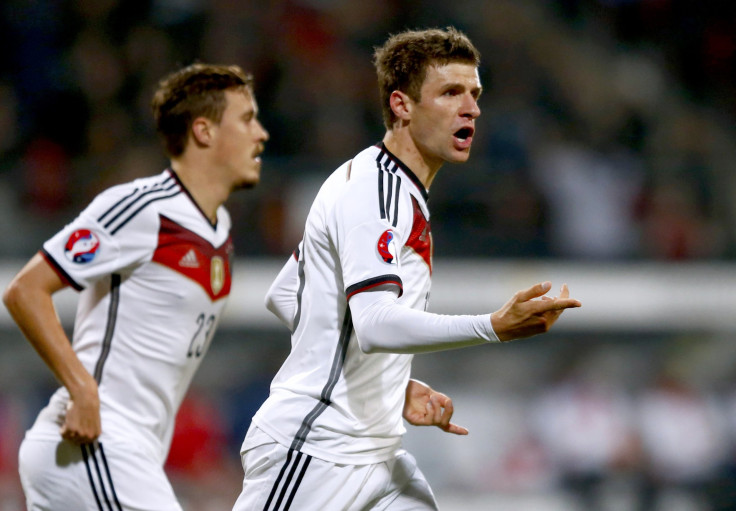Spain Vs. Germany 2014: TV Channel, Prediction, Live Stream Info For Friendly Between Europe's Soccer Giants

Germany will bring the curtain down on a year in which they became world champions by taking on the country they dethroned in Brazil this summer, Spain, in Vigo on Tuesday. The heavyweight clash maybe merely a friendly, but it a presents a chance for Joachim Löw’s side to confirm the shifting of power in world soccer.
From 2008 through 2012, Spain reigned supreme, with Germany playing catch-up. In the final of Euro 2008, it was Germany who were the victims as Spain claimed only their second major trophy thanks to Fernando Torres’s winner. Two years later, Germany, with their thrilling counter-attacking style having cast aside England and Argentina, looked the biggest threat to Spain adding the World Cup crown, but it was La Furia Roja’s tiki-taka that again came out on top, this time in the semifinals in South Africa.
The links between the two teams run deeper still. Germany had already revolutionized their style in the first decade of the 21st century, but it was the adoption of key aspects of Spain’s approach that finally saw them over the hump to end an 18-year trophy drought in Brazil. Playing far more proactively and now with the ability to dominate possession, added to the traditional physical strengths of the German game, Löw’s men beat Argentina in the final this summer to become world champions.
With such a wealth of talent, it was easy to predict that Germany could go on, if not to match the previous domination of Spain, then to at least be the team to beat for the foreseeable future. Yet since lifting the cup that July night in Rio de Janeiro things have not run smoothly for Germany.
A convincing 4-2 defeat by the team they had two months earlier beaten in the World Cup final could be easily brushed aside, but a stuttering start to their Euro 2016 qualifying campaign has raised more concern. An unconvincing home win over Scotland was followed by a 2-0 defeat at local rivals Poland and a frustrating home draw with the Republic of Ireland. Even a 4-0 win over Gibraltar in Nürnberg far from swept away the sense of post-World Cup malaise, given the newly admitted UEFA nation had been hammered 7-0 by both Poland and Ireland.
“I am not satisfied,” Löw said after the victory last Friday. “The team has not matched expectations or requirements. If we want to play as world champions, then four goals are too few. The level that was present before and during the World Cup has dropped.”
It remains probable that the slump is simply a case of a hangover from the exertions of becoming world champions and subsequent demands the title brings. And, given the expanded format of the European Championship, it would take an awful lot more, implausible, stumbles for Germany not to make it to France. But the retirement of stalwarts Philipp Lahm, Miroslav Klose and Per Mertesacker, as well as a continued list of injuries has also taken some toll. Against Spain, Löw will be unable to call upon Manuel Neuer, Jerome Boateng and Marco Reus.
Spain hardly fared any better than Germany upon their return from Brazil. A friendly defeat to France was soon followed by a shock qualifying loss at the hands of Slovakia, with Vicente del Bosque’s men continuing to look staid, lacking the spark to their play that helped them become arguably the greatest international team of all time.
But things have picked up in their last two matches, with some of the new faces, required to freshen up a side that had grown old together, beginning to make their mark. With Atletico Madrid’s Koke now impressing as a regular in a midfield for so long run by Xavi, Real Madrid’s Isco lit up a 3-0 win over Belarus on Friday with a sublime strike into the top corner 18 minutes into his first start for his country.
Prediction: The performances of the likes of Isco and Koke show why it was always wrong to write off Spain in the aftermath of their awful showing in Brazil. There is still some way to go before they get close to the force of old, but the country simply has too much quality coming through not to remain near the top of the world game. That is a place that Germany should also occupy for some time to come and Tuesday’s match could be repeated several times, and in far more meaningful scenarios, in the coming years. Currently, however, with Germany still struggling at the back and searching for the right formula in attack, Spain could come out on top.
Spain 2-1 Germany
Kickoff time: 2.45 p.m. EST
TV channel: ESPN Deportes
Live stream: ESPN3
© Copyright IBTimes 2025. All rights reserved.





















